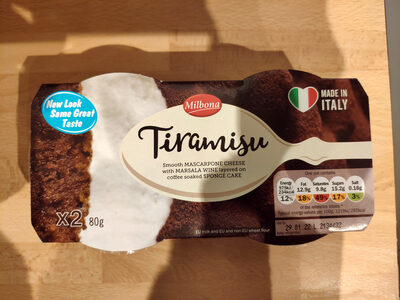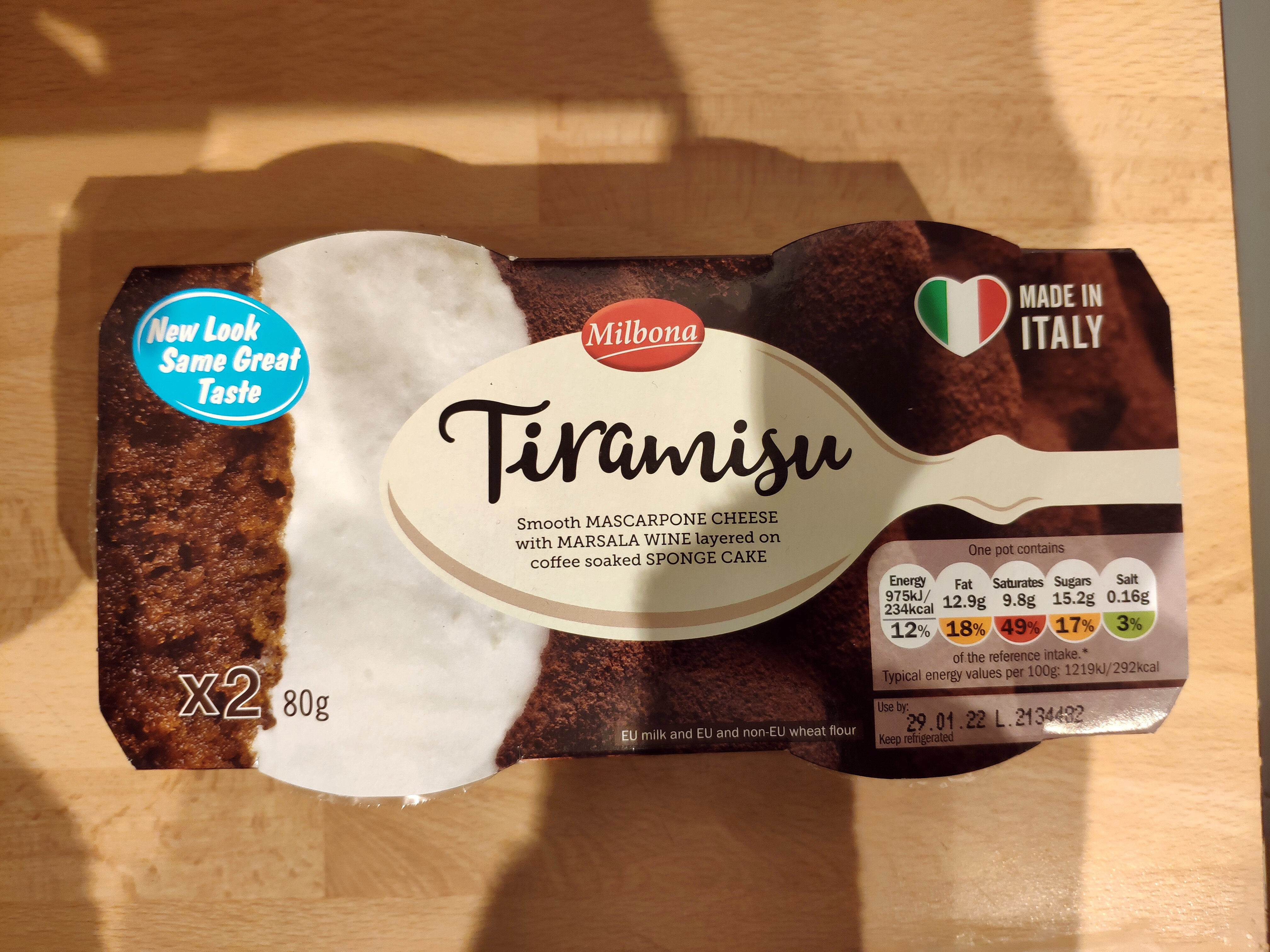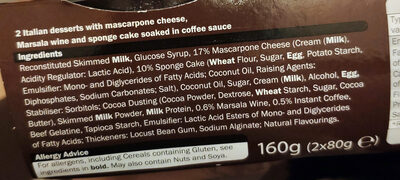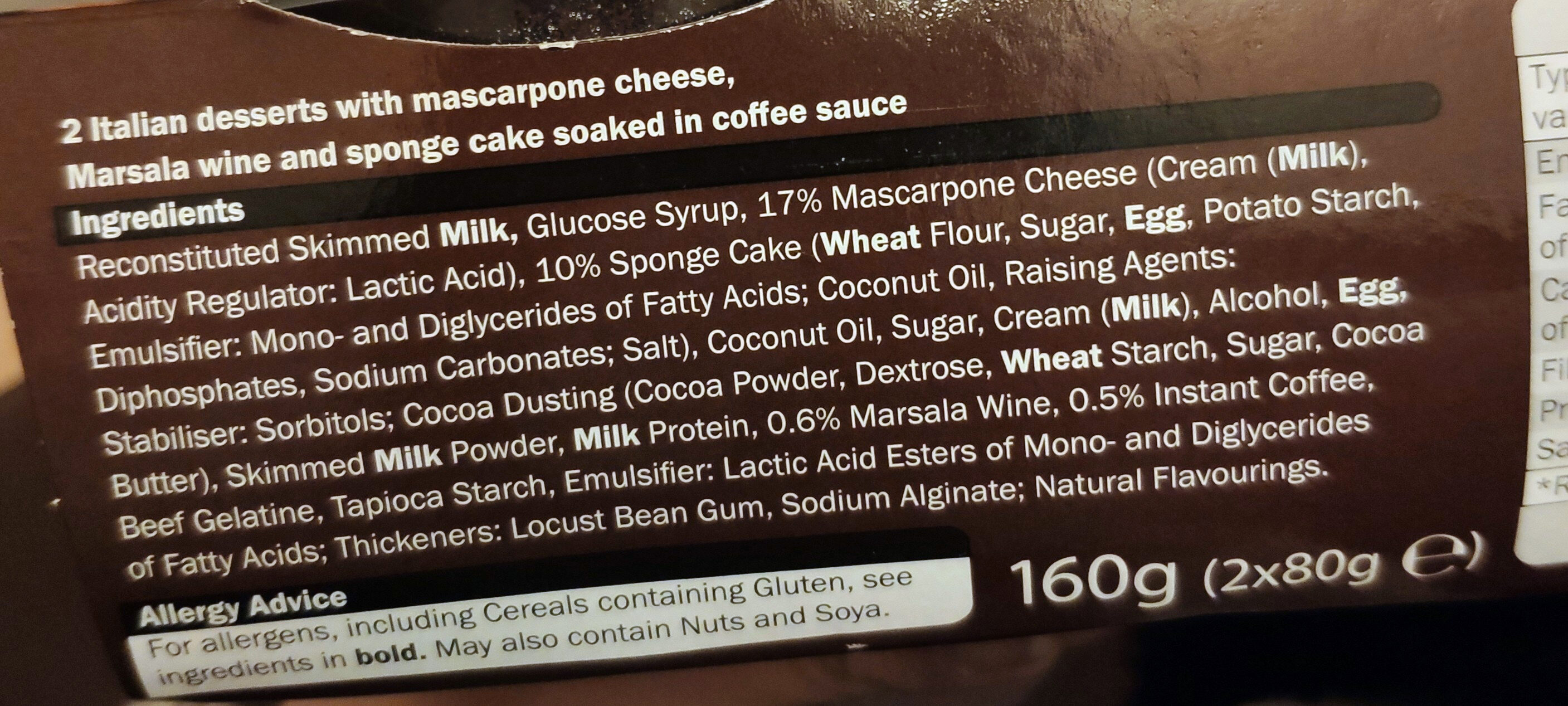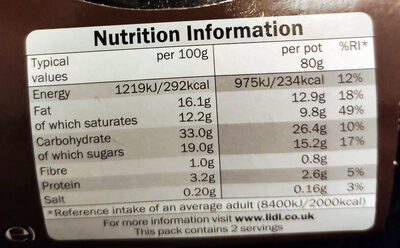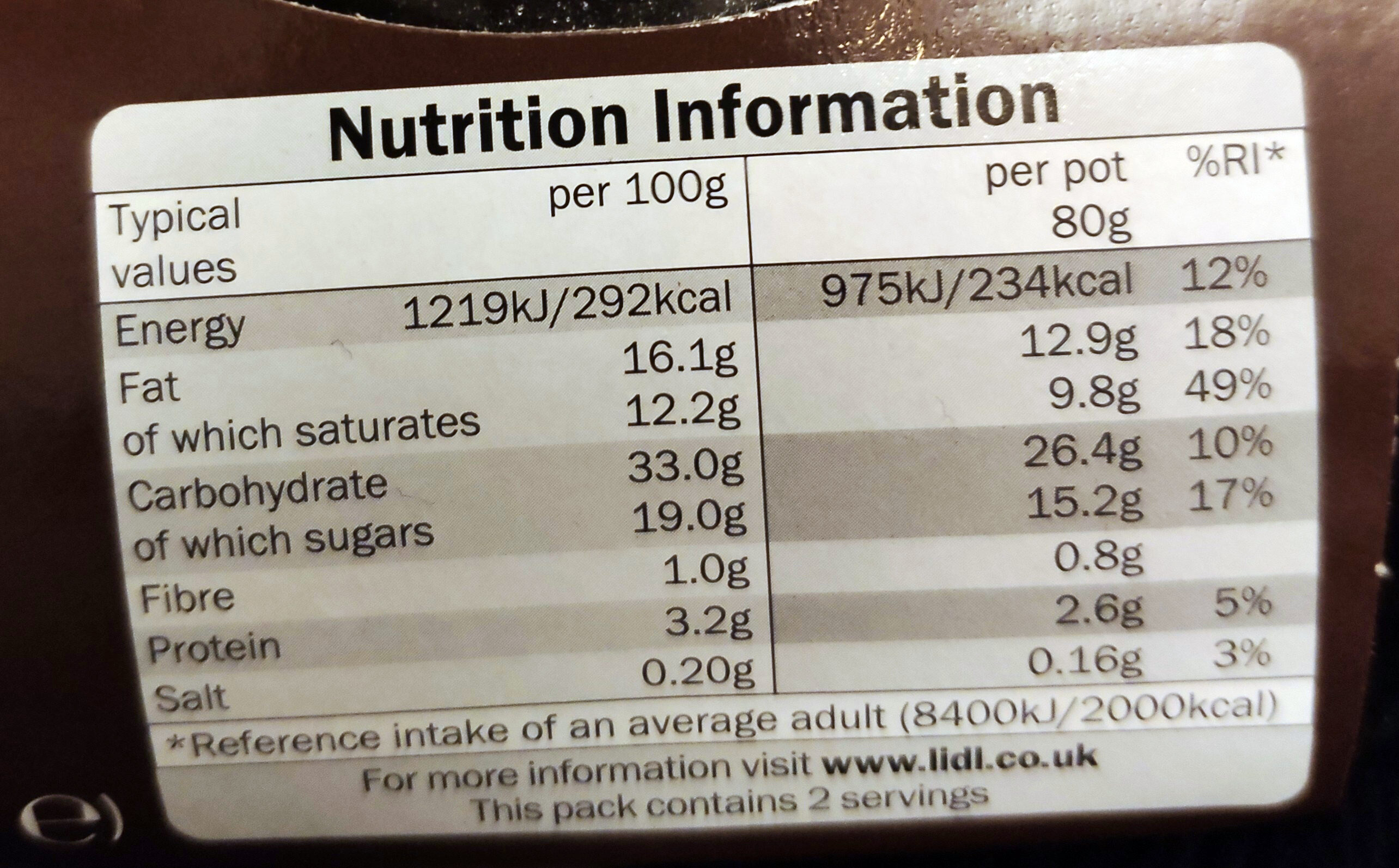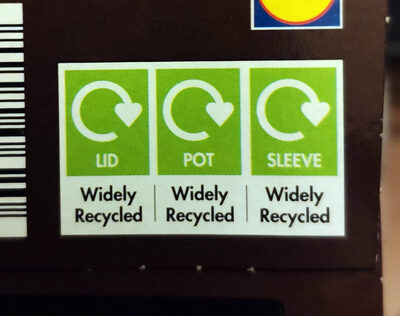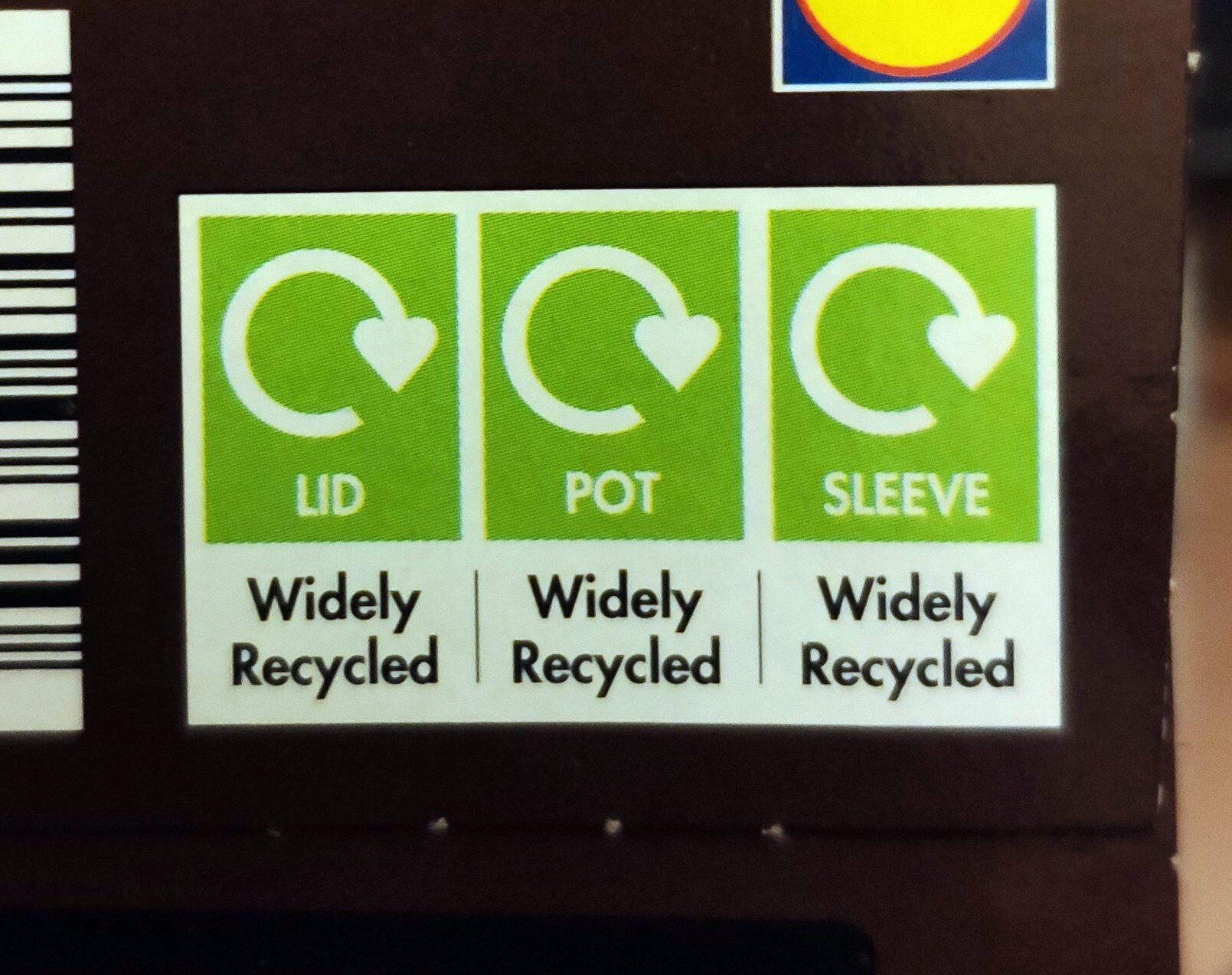Help us make food transparency the norm!
As a non-profit organization, we depend on your donations to continue informing consumers around the world about what they eat.
The food revolution starts with you!
Tiramisu - Milbona - 160 g
Tiramisu - Milbona - 160 g
Ambiguous barcode: This product has a Restricted Circulation Number barcode for products within a company. This means that different producers and stores can use the same barcode for different products.
×
Barcode: 20020620
Common name: Italian desserts with mascarpone cheese, Marsala wine and sponge cake soaked in coffee sauce
Quantity: 160 g
Packaging: Plastic, Pot, Cardboard, Container, Fresh, Non-corrugated cardboard, Pp-polypropylene, Seal, Sleeve, LDPE 4 - Low-density polyethylene, Card-sleeve, Mixed plastic film-lid, Point vert, Pp-pot
Brands: Milbona
Categories: Dairies, Snacks, Desserts, Sweet snacks, Dairy desserts, Biscuits and cakes, Fresh foods, Pastries, Tiramisu
Labels, certifications, awards: Contains alcohol, Do not freeze, Made in Italy
Origin of ingredients: Italy, Sicily, fr:91025 Marsala, fr:Marsala
Manufacturing or processing places: Dolcissimo Srl - Via Fratelli Cervi 41 - 20010 Ossona, (MI : Milan), Lombardie, Italie
Traceability code: IT 03 271 CE
Stores: Lidl
Countries where sold: France, Germany, Spain, United Kingdom
Matching with your preferences
Health
Ingredients
-
43 ingredients
Reconstituted Skimmed Milk, Glucose Syrup, Mascarpone Cheese 17% (Cream (Milk), Acidity Regulator (Lactic Acid)), Sponge Cake 10% (Wheat Flour, Sugar, Egg, Potato Starch, Emulsifier (Mono - and Diglycerides of Fatty Acids), Coconut Oil, Raising Agents (Diphosphates, Sodium Carbonates), Salt), Coconut Oil, Sugar, Cream (Milk), Alcohol, Egg, Stabiliser (Sorbitols), Cocoa Dusting (Cocoa Powder, Dextrose, Wheat Starch, Sugar, Cocoa Butter), Skimmed Milk Powder, Milk Protein, Marsala Wine 0.6%, Instant Coffee 0.5%, Beef Gelatine, Tapioca Starch, Emulsifier (Lactic Acid Esters of Mono - and Diglycerides of Fatty Acids), Thickeners (Locust Bean Gum, Sodium Alginate), Natural Flavourings.Allergens: Eggs, Gluten, MilkTraces: Nuts, Soybeans
Food processing
-
Ultra processed foods
Elements that indicate the product is in the 4 - Ultra processed food and drink products group:
- Additive: E401 - Sodium alginate
- Additive: E410 - Locust bean gum
- Additive: E420 - Sorbitol
- Additive: E428 - Gelatine
- Additive: E450 - Diphosphates
- Additive: E471 - Mono- and diglycerides of fatty acids
- Additive: E472b - Lactic acid esters of mono- and diglycerides of fatty acids
- Ingredient: Dextrose
- Ingredient: Emulsifier
- Ingredient: Flavouring
- Ingredient: Glucose
- Ingredient: Glucose syrup
- Ingredient: Milk proteins
- Ingredient: Thickener
Food products are classified into 4 groups according to their degree of processing:
- Unprocessed or minimally processed foods
- Processed culinary ingredients
- Processed foods
- Ultra processed foods
The determination of the group is based on the category of the product and on the ingredients it contains.
Additives
-
E270 - Lactic acid
Lactic acid: Lactic acid is an organic compound with the formula CH3CH-OH-COOH. In its solid state, it is white and water-soluble. In its liquid state, it is colorless. It is produced both naturally and synthetically. With a hydroxyl group adjacent to the carboxyl group, lactic acid is classified as an alpha-hydroxy acid -AHA-. In the form of its conjugate base called lactate, it plays a role in several biochemical processes. In solution, it can ionize a proton from the carboxyl group, producing the lactate ion CH3CH-OH-CO−2. Compared to acetic acid, its pKa is 1 unit less, meaning lactic acid deprotonates ten times more easily than acetic acid does. This higher acidity is the consequence of the intramolecular hydrogen bonding between the α-hydroxyl and the carboxylate group. Lactic acid is chiral, consisting of two optical isomers. One is known as L--+--lactic acid or -S--lactic acid and the other, its mirror image, is D--−--lactic acid or -R--lactic acid. A mixture of the two in equal amounts is called DL-lactic acid, or racemic lactic acid. Lactic acid is hygroscopic. DL-lactic acid is miscible with water and with ethanol above its melting point which is around 17 or 18 °C. D-lactic acid and L-lactic acid have a higher melting point. In animals, L-lactate is constantly produced from pyruvate via the enzyme lactate dehydrogenase -LDH- in a process of fermentation during normal metabolism and exercise. It does not increase in concentration until the rate of lactate production exceeds the rate of lactate removal, which is governed by a number of factors, including monocarboxylate transporters, concentration and isoform of LDH, and oxidative capacity of tissues. The concentration of blood lactate is usually 1–2 mM at rest, but can rise to over 20 mM during intense exertion and as high as 25 mM afterward. In addition to other biological roles, L-lactic acid is the primary endogenous agonist of hydroxycarboxylic acid receptor 1 -HCA1-, which is a Gi/o-coupled G protein-coupled receptor -GPCR-.In industry, lactic acid fermentation is performed by lactic acid bacteria, which convert simple carbohydrates such as glucose, sucrose, or galactose to lactic acid. These bacteria can also grow in the mouth; the acid they produce is responsible for the tooth decay known as caries. In medicine, lactate is one of the main components of lactated Ringer's solution and Hartmann's solution. These intravenous fluids consist of sodium and potassium cations along with lactate and chloride anions in solution with distilled water, generally in concentrations isotonic with human blood. It is most commonly used for fluid resuscitation after blood loss due to trauma, surgery, or burns.Source: Wikipedia
-
E410 - Locust bean gum
Locust bean gum: Locust bean gum -LBG, also known as carob gum, carob bean gum, carobin, E410- is a thickening agent and a gelling agent used in food technology.Source: Wikipedia
-
E420 - Sorbitol
Sorbitol: Sorbitol --, less commonly known as glucitol --, is a sugar alcohol with a sweet taste which the human body metabolizes slowly. It can be obtained by reduction of glucose, which changes the aldehyde group to a hydroxyl group. Most sorbitol is made from corn syrup, but it is also found in nature, for example in apples, pears, peaches, and prunes. It is converted to fructose by sorbitol-6-phosphate 2-dehydrogenase. Sorbitol is an isomer of mannitol, another sugar alcohol; the two differ only in the orientation of the hydroxyl group on carbon 2. While similar, the two sugar alcohols have very different sources in nature, melting points, and uses.Source: Wikipedia
-
E450 - Diphosphates
Diphosphates (E450) are food additives often utilized to modify the texture of products, acting as leavening agents in baking and preventing the coagulation of canned food.
These salts can stabilize whipped cream and are also found in powdered products to maintain their flow properties. They are commonly present in baked goods, processed meats, and soft drinks.
Derived from phosphoric acid, they're part of our daily phosphate intake, which often surpasses recommended levels due to the prevalence of phosphates in processed foods and drinks.
Excessive phosphate consumption is linked to health issues, such as impaired kidney function and weakened bone health. Though diphosphates are generally regarded as safe when consumed within established acceptable daily intakes, it's imperative to monitor overall phosphate consumption to maintain optimal health.
-
E471 - Mono- and diglycerides of fatty acids
Mono- and diglycerides of fatty acids (E471), are food additives commonly used as emulsifiers in various processed foods.
These compounds consist of glycerol molecules linked to one or two fatty acid chains, which help stabilize and blend water and oil-based ingredients. E471 enhances the texture and shelf life of products like margarine, baked goods, and ice cream, ensuring a smooth and consistent texture.
It is generally considered safe for consumption within established regulatory limits.
-
E500 - Sodium carbonates
Sodium carbonates (E500) are compounds commonly used in food preparation as leavening agents, helping baked goods rise by releasing carbon dioxide when they interact with acids.
Often found in baking soda, they regulate the pH of food, preventing it from becoming too acidic or too alkaline. In the culinary world, sodium carbonates can also enhance the texture and structure of foods, such as noodles, by modifying the gluten network.
Generally recognized as safe, sodium carbonates are non-toxic when consumed in typical amounts found in food.
Ingredients analysis
-
May contain palm oil
Ingredients that may contain palm oil: E471, E472b
-
Non-vegan
Non-vegan ingredients: Reconstituted skimmed milk, Mascarpone, Cream, Egg, Cream, Egg, Skimmed milk powder, Milk proteins, Beef gelatinSome ingredients could not be recognized.
We need your help!
You can help us recognize more ingredients and better analyze the list of ingredients for this product and others:
- Edit this product page to correct spelling mistakes in the ingredients list, and/or to remove ingredients in other languages and sentences that are not related to the ingredients.
- Add new entries, synonyms or translations to our multilingual lists of ingredients, ingredient processing methods, and labels.
If you would like to help, join the #ingredients channel on our Slack discussion space and/or learn about ingredients analysis on our wiki. Thank you!
-
Non-vegetarian
Non-vegetarian ingredients: Beef gelatinSome ingredients could not be recognized.
We need your help!
You can help us recognize more ingredients and better analyze the list of ingredients for this product and others:
- Edit this product page to correct spelling mistakes in the ingredients list, and/or to remove ingredients in other languages and sentences that are not related to the ingredients.
- Add new entries, synonyms or translations to our multilingual lists of ingredients, ingredient processing methods, and labels.
If you would like to help, join the #ingredients channel on our Slack discussion space and/or learn about ingredients analysis on our wiki. Thank you!
-
Details of the analysis of the ingredients
We need your help!
Some ingredients could not be recognized.
We need your help!
You can help us recognize more ingredients and better analyze the list of ingredients for this product and others:
- Edit this product page to correct spelling mistakes in the ingredients list, and/or to remove ingredients in other languages and sentences that are not related to the ingredients.
- Add new entries, synonyms or translations to our multilingual lists of ingredients, ingredient processing methods, and labels.
If you would like to help, join the #ingredients channel on our Slack discussion space and/or learn about ingredients analysis on our wiki. Thank you!
: Reconstituted Skimmed _Milk_, Glucose Syrup, Mascarpone Cheese 17% (Cream, Acidity Regulator (Lactic Acid)), Sponge Cake 10% (_Wheat_ Flour, Sugar, _Egg_, Potato Starch, Emulsifier (mono- and Diglycerides of Fatty Acids), Coconut Oil, Raising Agents (Diphosphates, Sodium Carbonates), Salt), Coconut Oil, Sugar, Cream, Alcohol, _Egg_, Stabiliser (Sorbitols), Cocoa Dusting (Cocoa Powder, Dextrose, _Wheat_ Starch, Sugar, Cocoa Butter), Skimmed _Milk_ Powder, _Milk_ Protein, Marsala Wine 0.6%, Instant Coffee 0.5%, Beef Gelatine, Tapioca Starch, Emulsifier (Lactic Acid Esters of mono- and Diglycerides of Fatty Acids), Thickeners (Locust Bean Gum, Sodium Alginate), Natural Flavourings- Reconstituted Skimmed _Milk_ -> en:reconstituted-skimmed-milk - vegan: no - vegetarian: yes - ciqual_proxy_food_code: 19051 - percent_min: 17 - percent_max: 49.5
- Glucose Syrup -> en:glucose-syrup - vegan: yes - vegetarian: yes - ciqual_proxy_food_code: 31016 - percent_min: 17 - percent_max: 33.25
- Mascarpone Cheese -> en:mascarpone - vegan: no - vegetarian: maybe - ciqual_food_code: 19584 - percent_min: 17 - percent: 17 - percent_max: 17
- Cream -> en:cream - vegan: no - vegetarian: yes - ciqual_food_code: 19402 - percent_min: 8.5 - percent_max: 17
- Acidity Regulator -> en:acidity-regulator - percent_min: 0 - percent_max: 8.5
- Lactic Acid -> en:e270 - vegan: yes - vegetarian: yes - percent_min: 0 - percent_max: 8.5
- Sponge Cake -> en:sponge-cake - ciqual_food_code: 23594 - percent_min: 10 - percent: 10 - percent_max: 10
- _Wheat_ Flour -> en:wheat-flour - vegan: yes - vegetarian: yes - ciqual_proxy_food_code: 9410 - percent_min: 1.25 - percent_max: 10
- Sugar -> en:sugar - vegan: yes - vegetarian: yes - ciqual_proxy_food_code: 31016 - percent_min: 0 - percent_max: 5
- _Egg_ -> en:egg - vegan: no - vegetarian: yes - ciqual_food_code: 22000 - percent_min: 0 - percent_max: 3.33333333333333
- Potato Starch -> en:potato-starch - vegan: yes - vegetarian: yes - ciqual_proxy_food_code: 9510 - percent_min: 0 - percent_max: 2.5
- Emulsifier -> en:emulsifier - percent_min: 0 - percent_max: 2
- mono- and Diglycerides of Fatty Acids -> en:e471 - vegan: maybe - vegetarian: maybe - from_palm_oil: maybe - percent_min: 0 - percent_max: 2
- Coconut Oil -> en:coconut-oil - vegan: yes - vegetarian: yes - from_palm_oil: no - ciqual_food_code: 16040 - percent_min: 0 - percent_max: 1.66666666666667
- Raising Agents -> en:raising-agent - percent_min: 0 - percent_max: 1.42857142857143
- Diphosphates -> en:e450 - vegan: yes - vegetarian: yes - percent_min: 0 - percent_max: 1.42857142857143
- Sodium Carbonates -> en:e500 - vegan: yes - vegetarian: yes - percent_min: 0 - percent_max: 0.714285714285714
- Salt -> en:salt - vegan: yes - vegetarian: yes - ciqual_food_code: 11058 - percent_min: 0 - percent_max: 0.2
- Coconut Oil -> en:coconut-oil - vegan: yes - vegetarian: yes - from_palm_oil: no - ciqual_food_code: 16040 - percent_min: 0.6 - percent_max: 10
- Sugar -> en:sugar - vegan: yes - vegetarian: yes - ciqual_proxy_food_code: 31016 - percent_min: 0.6 - percent_max: 10
- Cream -> en:cream - vegan: no - vegetarian: yes - ciqual_food_code: 19402 - percent_min: 0.6 - percent_max: 10
- Alcohol -> en:alcohol - vegan: maybe - vegetarian: yes - ciqual_food_code: 1014 - percent_min: 0.6 - percent_max: 9.03333333333333
- _Egg_ -> en:egg - vegan: no - vegetarian: yes - ciqual_food_code: 22000 - percent_min: 0.6 - percent_max: 7.65714285714286
- Stabiliser -> en:stabiliser - percent_min: 0.6 - percent_max: 6.625
- Sorbitols -> en:e420 - vegan: yes - vegetarian: yes - percent_min: 0.6 - percent_max: 6.625
- Cocoa Dusting -> en:cocoa-dusting - percent_min: 0.6 - percent_max: 5.82222222222222
- Cocoa Powder -> en:cocoa-powder - vegan: yes - vegetarian: yes - ciqual_food_code: 18100 - percent_min: 0.12 - percent_max: 5.82222222222222
- Dextrose -> en:dextrose - vegan: yes - vegetarian: yes - ciqual_proxy_food_code: 31016 - percent_min: 0 - percent_max: 2.91111111111111
- _Wheat_ Starch -> en:wheat-starch - vegan: yes - vegetarian: yes - ciqual_proxy_food_code: 9510 - percent_min: 0 - percent_max: 1.94074074074074
- Sugar -> en:sugar - vegan: yes - vegetarian: yes - ciqual_proxy_food_code: 31016 - percent_min: 0 - percent_max: 1.45555555555556
- Cocoa Butter -> en:cocoa-butter - vegan: yes - vegetarian: yes - ciqual_food_code: 16030 - percent_min: 0 - percent_max: 1.16444444444444
- Skimmed _Milk_ Powder -> en:skimmed-milk-powder - vegan: no - vegetarian: yes - ciqual_food_code: 19054 - percent_min: 0.6 - percent_max: 5.18
- _Milk_ Protein -> en:milk-proteins - vegan: no - vegetarian: yes - percent_min: 0.6 - percent_max: 4.65454545454546
- Marsala Wine -> en:marsala-wine - vegan: maybe - vegetarian: yes - ciqual_food_code: 1015 - percent_min: 0.6 - percent: 0.6 - percent_max: 0.6
- Instant Coffee -> en:instant-coffee - vegan: yes - vegetarian: yes - ciqual_food_code: 18005 - percent_min: 0.5 - percent: 0.5 - percent_max: 0.5
- Beef Gelatine -> en:beef-gelatin - vegan: no - vegetarian: no - percent_min: 0 - percent_max: 0.5
- Tapioca Starch -> en:tapioca - vegan: yes - vegetarian: yes - ciqual_proxy_food_code: 9510 - percent_min: 0 - percent_max: 0.5
- Emulsifier -> en:emulsifier - percent_min: 0 - percent_max: 0.5
- Lactic Acid Esters of mono- and Diglycerides of Fatty Acids -> en:e472b - vegan: maybe - vegetarian: maybe - from_palm_oil: maybe - percent_min: 0 - percent_max: 0.5
- Thickeners -> en:thickener - percent_min: 0 - percent_max: 0.5
- Locust Bean Gum -> en:e410 - vegan: yes - vegetarian: yes - percent_min: 0 - percent_max: 0.5
- Sodium Alginate -> en:e401 - vegan: yes - vegetarian: yes - percent_min: 0 - percent_max: 0.25
- Natural Flavourings -> en:natural-flavouring - vegan: maybe - vegetarian: maybe - percent_min: 0 - percent_max: 0.5
Nutrition
-
Poor nutritional quality
⚠ ️Warning: the amount of fruits, vegetables and nuts is not specified on the label, it was estimated from the list of ingredients: 0This product is not considered a beverage for the calculation of the Nutri-Score.
Positive points: 0
- Proteins: 1 / 5 (value: 3.2, rounded value: 3.2)
- Fiber: 0 / 5 (value: 0, rounded value: 0)
- Fruits, vegetables, nuts, and colza/walnut/olive oils: 0 / 5 (value: 0, rounded value: 0)
Negative points: 17
- Energy: 3 / 10 (value: 1274, rounded value: 1274)
- Sugars: 4 / 10 (value: 19, rounded value: 19)
- Saturated fat: 10 / 10 (value: 12.2, rounded value: 12.2)
- Sodium: 0 / 10 (value: 80, rounded value: 80)
The points for proteins are not counted because the negative points are greater or equal to 11.
Nutritional score: (17 - 0)
Nutri-Score:
-
Nutrient levels
-
Fat in moderate quantity (16.1%)
What you need to know- A high consumption of fat, especially saturated fats, can raise cholesterol, which increases the risk of heart diseases.
Recommendation: Limit the consumption of fat and saturated fat- Choose products with lower fat and saturated fat content.
-
Saturated fat in high quantity (12.2%)
What you need to know- A high consumption of fat, especially saturated fats, can raise cholesterol, which increases the risk of heart diseases.
Recommendation: Limit the consumption of fat and saturated fat- Choose products with lower fat and saturated fat content.
-
Sugars in high quantity (19%)
What you need to know- A high consumption of sugar can cause weight gain and tooth decay. It also augments the risk of type 2 diabetes and cardio-vascular diseases.
Recommendation: Limit the consumption of sugar and sugary drinks- Sugary drinks (such as sodas, fruit beverages, and fruit juices and nectars) should be limited as much as possible (no more than 1 glass a day).
- Choose products with lower sugar content and reduce the consumption of products with added sugars.
-
Salt in low quantity (0.2%)
What you need to know- A high consumption of salt (or sodium) can cause raised blood pressure, which can increase the risk of heart disease and stroke.
- Many people who have high blood pressure do not know it, as there are often no symptoms.
- Most people consume too much salt (on average 9 to 12 grams per day), around twice the recommended maximum level of intake.
Recommendation: Limit the consumption of salt and salted food- Reduce the quantity of salt used when cooking, and don't salt again at the table.
- Limit the consumption of salty snacks and choose products with lower salt content.
-
-
Nutrition facts
Nutrition facts As sold
for 100 g / 100 mlAs sold
per serving (80g)Compared to: Tiramisu Energy 1,274 kj
(305 kcal)1,020 kj
(244 kcal)+14% Fat 16.1 g 12.9 g +31% Saturated fat 12.2 g 9.76 g +47% Carbohydrates 33 g 26.4 g +2% Sugars 19 g 15.2 g -12% Fiber 0 g 0 g -100% Proteins 3.2 g 2.56 g -22% Salt 0.2 g 0.16 g +10% Fruits‚ vegetables‚ nuts and rapeseed‚ walnut and olive oils (estimate from ingredients list analysis) 0 % 0 %
Environment
-
Eco-Score E - Very high environmental impact
⚠ ️Select a country in order to include the full impact of transportation.The Eco-Score is an experimental score that summarizes the environmental impacts of food products.→ The Eco-Score was initially developped for France and it is being extended to other European countries. The Eco-Score formula is subject to change as it is regularly improved to make it more precise and better suited to each country.Life cycle analysis
-
Average impact of products of the same category: E (Score: 17/100)
Category: Tiramisu, refrigerated
Category: Tiramisu, refrigerated
- PEF environmental score: 1.66 (the lower the score, the lower the impact)
- including impact on climate change: 11.23 kg CO2 eq/kg of product
Stage Impact Agriculture
82.9 %Processing
13.7 %Packaging
0.9 %Transportation
1.7 %Distribution
0.5 %Consumption
0.1 %
Bonuses and maluses
-
Origins of ingredients with a medium impact
Bonus: +2
Environmental policy: +2
Transportation: 0
Origin of the product and/or its ingredients % of ingredients Impact Italy 100 %Medium
-
Packaging with a high impact
Malus: -15
Shape Material Recycling Impact Sleeve Non-corrugated cardboard Low Film PP 5 - Polypropylene High Container LDPE 4 - Low-density polyethylene High Pot PP 5 - Polypropylene High Seal Unknown High ⚠ ️ The information about the packaging of this product is not sufficiently precise (exact shapes and materials of all components of the packaging).⚠ ️ For a more precise calculation of the Eco-Score, you can modify the product page and add them.
If you are the manufacturer of this product, you can send us the information with our free platform for producers.
Eco-Score for this product
-
Impact for this product: E (Score: 4/100)
Product: Tiramisu - Milbona - 160 g
Life cycle analysis score: 17
Sum of bonuses and maluses: -13
Final score: 4/100
-
Carbon footprint
-
Equal to driving 5.8 km in a petrol car
1123 g CO² per 100g of product
The carbon emission figure comes from ADEME's Agribalyse database, for the category: Tiramisu, refrigerated (Source: ADEME Agribalyse Database)
Stage Impact Agriculture
75.7 %Processing
19.6 %Packaging
1.7 %Transportation
2.6 %Distribution
0.3 %Consumption
0.1 %
Packaging
-
Packaging with a high impact
-
Packaging parts
Sleeve (Non-corrugated cardboard)
Film (PP 5 - Polypropylene)
Container (LDPE 4 - Low-density polyethylene)
Pot (PP 5 - Polypropylene)
Seal
-
Packaging materials
Material % Packaging weight Packaging weight per 100 g of product Paper or cardboard Plastic Total
-
Transportation
-
Origins of ingredients
Origins of ingredients with a medium impact
Origin of the product and/or its ingredients % of ingredients Impact Italy 100 %Medium
Report a problem
-
Incomplete or incorrect information?
Category, labels, ingredients, allergens, nutritional information, photos etc.
If the information does not match the information on the packaging, please complete or correct it. Open Food Facts is a collaborative database, and every contribution is useful for all.
Data sources
Product added on by steff75
Last edit of product page on by cporru.
Product page also edited by aleene, alia, anticultist, beniben, date-limite-app, ecoscore-impact-estimator, foodrepo, jacob80, kiliweb, moon-rabbit, openfoodfacts-contributors, packbot, sil, swipe-studio, tacite, tacite-mass-editor, teolemon.
